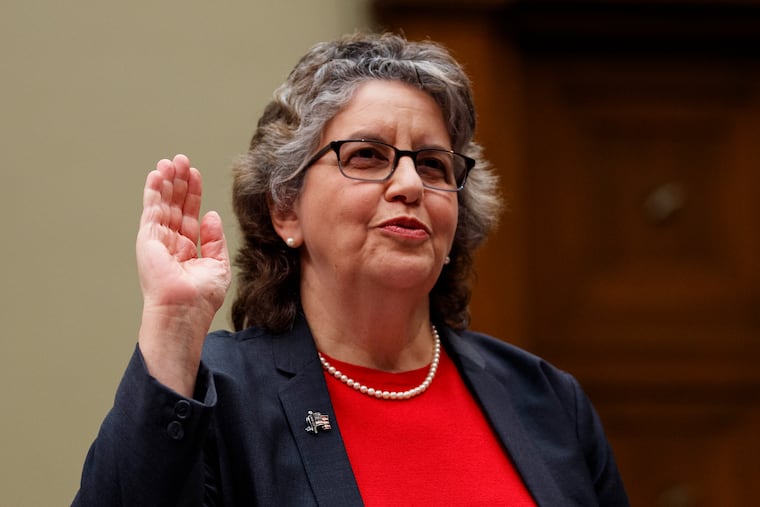The agency that polices America’s elections is paralyzed. The blunt FEC chair on why that’s bad for 2020.
Ellen Weintraub told Temple students that the commission is toothless in a time when elections are threatened by foreign interference and new technologies make it harder to know where ads are coming from.

The chair of the Federal Election Commission, in her signature forthright style, on Thursday morning retweeted a statement she’d made in June, adding the comment: “Is this thing on?”
Ellen Weintraub, a member of the commission since 2002, wanted to remind the Twitterverse that foreign interference in U.S. elections is illegal.
“Let me make something 100% clear ... ,” the statement read. "It is illegal for any person to solicit, accept or receive anything of value from a foreign national in connection with a U.S. election. This is not a novel concept. Electoral intervention from foreign governments has been considered unacceptable since the beginnings of our nation.”
The reminder came Thursday, as President Donald Trump admitted and defended pushing Ukraine for dirt on Joe Biden and his son Hunter; Trump called on China to investigate the Bidens as well.
Weintraub is in a unique position. The agency she heads, tasked with enforcing federal campaign finance laws, is currently toothless in enforcing them. She spoke to students at Temple University on Wednesday, as part of a tour of universities in the region to help educate the public on the rules regarding money in politics.
“It’s a somewhat perilous time for democracy,” Weintraub said. “... People are willing to push the envelope on the laws and I think that’s where it’s really vital to have a body that is willing to push back and to enforce the laws and right now, as you probably know, we can’t really do that.”
Weintraub, a Democrat appointed during George W. Bush’s presidency, is one of three commissioners at the FEC, which has a normal complement of six and needs four members to have a voting quorum. Without the quorum, absent since a commissioner stepped down at the end of August, the FEC can’t investigate complaints, issue opinions, or fine violators.
Historically, commissioners are confirmed in pairs, one Democrat and one Republican. Trump nominated a Republican attorney from Texas, Trey Trainor, nearly two years ago. Senate Democrats have recommended Shana Broussard, an attorney, but neither party has moved forward.
The agency’s staff of about 300 still maintains the huge database of campaign contributions and spending, and collects complaints, although they can’t be acted upon. There’s a five-year statute of limitations. Any flagrant violations of the law could go to the Justice Department for criminal investigation.
Weintraub said in remarks to students and in an interview after her appearance at Temple that she is concerned about candidate behavior and foreign influence in a critical election year.
Without a quorum candidate behavior can’t really be checked
When Andrew Yang announced he was going to give $1,000 a month to 10 families to pilot his universal basic income idea, all eyes turned to the FEC to weigh in on whether that violated election law. The agency was mute.
“We can’t tell him,” Weintraub said. So what happens if candidates step out of bounds or into a similar gray area as Yang?
“Not having commissioners there to weigh in on this does perhaps encourage some of the more aggressive actors out there,” she said.
All of this means that the FEC has about 300 enforcement matters on hold; 60 of those are investigations that have been completed, awaiting a decision from commissioners.
Foreign influence remains a “great concern”
Weintraub has consistently voiced concern over the ongoing threat of foreign influence in elections. The FEC has started drafting changes to campaign finance law in light of lessons learned from counsel Robert Mueller’s investigation into Russian interference in the 2016 election.
“We saw it in 2016 and we’re likely to see it again in 2020, in part because I don’t think we’ve done enough to discourage it,” she said.
There are bills in Congress that adopt sanctions against any country that would attempt to intervene in the elections, but they haven’t moved forward.
An Honest Ads Act would require more complete disclosures of who is responsible for advertisements online, but that has not progressed in Congress either. She said it’s appalling to think foreign interference is a “partisan issue.”
Even internally, there is discord at the FEC over foreign interference.
Last weekend Weintraub fired off a tweet storm with a memo she’d written about foreign interference that she said her Republican colleague had blocked from being published in a newsletter. (The colleague, Caroline Hunter, later responded that she didn’t want the commission putting something out that couldn’t be adopted without four votes.)
Ad transparency remains an issue
Where ads are coming from has gotten increasingly harder to determine with new platforms. In 2016, Weintraub said Facebook “had no idea what it was doing.” Some ads were bought with Russian rubles, she said.
This time around she credited Facebook for beginning to require disclaimers on all ads, but said transparency shouldn’t be left up to platforms. Determining what is an issue ad and what is a political ad, for instance, can be tricky.
The FEC, she said, is “always playing catch-up,” as new technologies develop. “We’re writing rules to address what happened in the last election.”